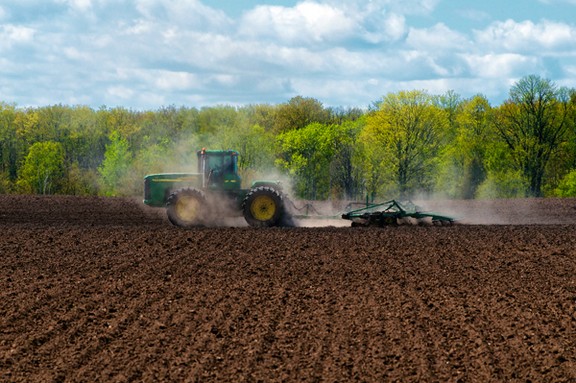Renting Your Farmland – Do You Know the Rules?
- Share
- Tweet
- Pin
- Share

The increasing attention paid to agricultural contamination of groundwater is catching the eyes of landowners who rent their property to farmers.
Tim Siehr, county executive director at the Farm Service Agency, estimates more than 50 percent of land farmed in Door County is not owned by the farmer working it.
For large property owners, it’s more efficient to rent land to farmers than to farm it themselves or to simply sit on it and pay the associated taxes. For farmers, they get to work the land without the costs associated with ownership, giving them more land to crop, but also more fields to spread excess manure onto.
As groundwater contamination associated with manure spreading continues to make statewide news, it’s increasingly important for landowners to know their responsibilities before renting their land for farming.
Responsibility Not Clear-cut
Property owners might assume that liability for agriculturally related water contamination falls on the farmer who caused the spill, “but it’s not completely clear cut,” said Trevor Bannister, who provides technical information for the Agricultural Chemical Cleanup Program at the Wisconsin Department of Agriculture, Trade and Consumer Protection (DATCP).
He said that in the event of a contamination event, the DATCP and the Department of Natural Resources (DNR) would approach the spiller to hold them responsible.
“But ultimately it does revert to the current property owner,” Bannister said.
Landowners and land operators are both responsible for compliance with county, state, and federal standards. In 2004, the county board adopted Chapter 23 of the Door County Code, designating inspection, citation and compliance authority to the Door County soil and Water Conservation Department (SWCD).
If a property in Door County falls out of compliance, tracking down the responsible parties can be time-consuming, said SWCD head Bill Schuster. The property owner may live out of the county or out of the state, while the farmer may not reside in Door County.
A citation for a first violation of environmental code costs $263.50 while all subsequent offenses cost $389.50. The court can also order that a farmer cease operations on the property.
Hazardous agricultural spills can come in the form of pesticides, petroleum, fertilizers, waste milk and, most prominently, manure. In cases where the person responsible for a spill cannot be identified, such as the illegal and anonymous dumping of waste products on the land, the property owner may become liable.
For example, the property owner may be liable if they own or control the hazardous material. Wisconsin statute 292.11 (3) states that, “a person who possesses or controls a hazardous substance which is discharged… shall take the actions necessary to restore the environment to the extent practicable and minimize the harmful effects.”
This statute is of particular note to those who enter into crop share agreements.
Crop Shares
A crop share agreement, in which a property owner pays a portion of expenses in exchange for a share of revenue from the harvest, introduces distinct complications. Sharing expenses does not necessarily man the sharing of responsibility.
“We would not assign fractions of responsibility,” said Donna Gilson, attorney at the DATCP. “We would likely select the ‘most culpable’ as the responsible party and allow the parties to work out the details among themselves.”
Just because a property owner is paying a portion of expenses in a crop share agreement does not mean he or she owns a portion of the materials and is liable for their spill. However, if the landowner supplies equipment or materials (such as manure, fertilizer, or other chemicals) he or she may be found liable as well.
Property owners set ground the rules
With increased focus on the improper spreading of manure, property owners are becoming more involved in the use of their land than in the past.
“Because more landlords are aware that they are responsible they say, ‘well we want everything done right,’ and we’ve been saying to them that it’s your land, you can require whatever you want,” said Schuster.
Siehr is a property owner who has rented his land out for farming in the past. He recently received a letter from the SWCD reminding him of his responsibility in keeping his land clean.
“To me it makes sense that if you’re renting your land to a neighbor and you’re letting your neighbor do whatever he wants to the detriment of the environment or to the neighbor’s, I would say there might be some responsibility there to maybe hold that tenant to a little more control,” said Siehr.
Landowners have the ultimate power with the contracts they present to a farmer.
“They have more authority than us in government,” said Schuster. “It’s their land, they can do what they want… If you look at a standard and you think it’s ridiculous that non-CAFO farms can apply manure on six-inch soils to bedrock, you can put in your contract that you have to have x number of feet to bedrock.”
There is a shortage of cropland, Schuster said, which puts landlords in position to demand more restrictive contracts.
“If a farmer were to say, ‘I won’t rent that’, there will be another farmer that will pick it up,” Shuster said. “Guaranteed.”
